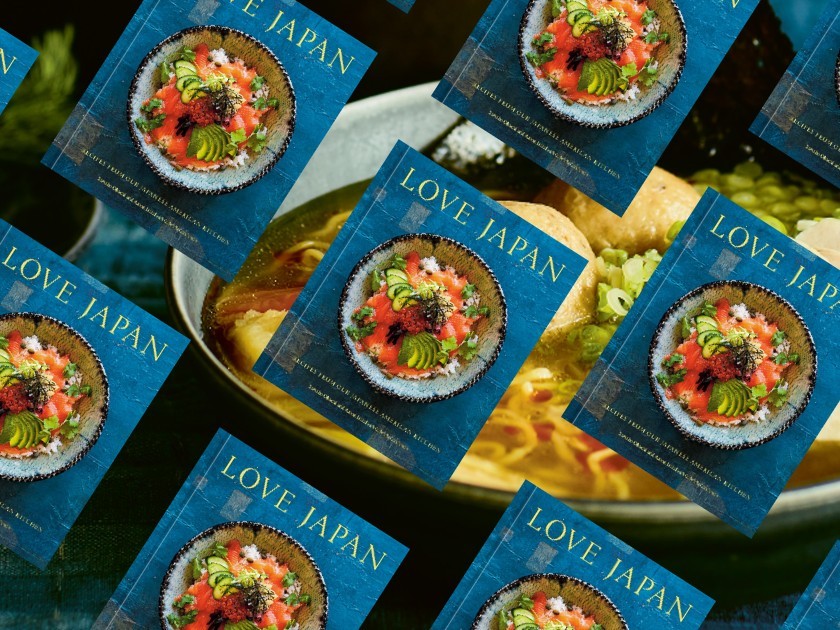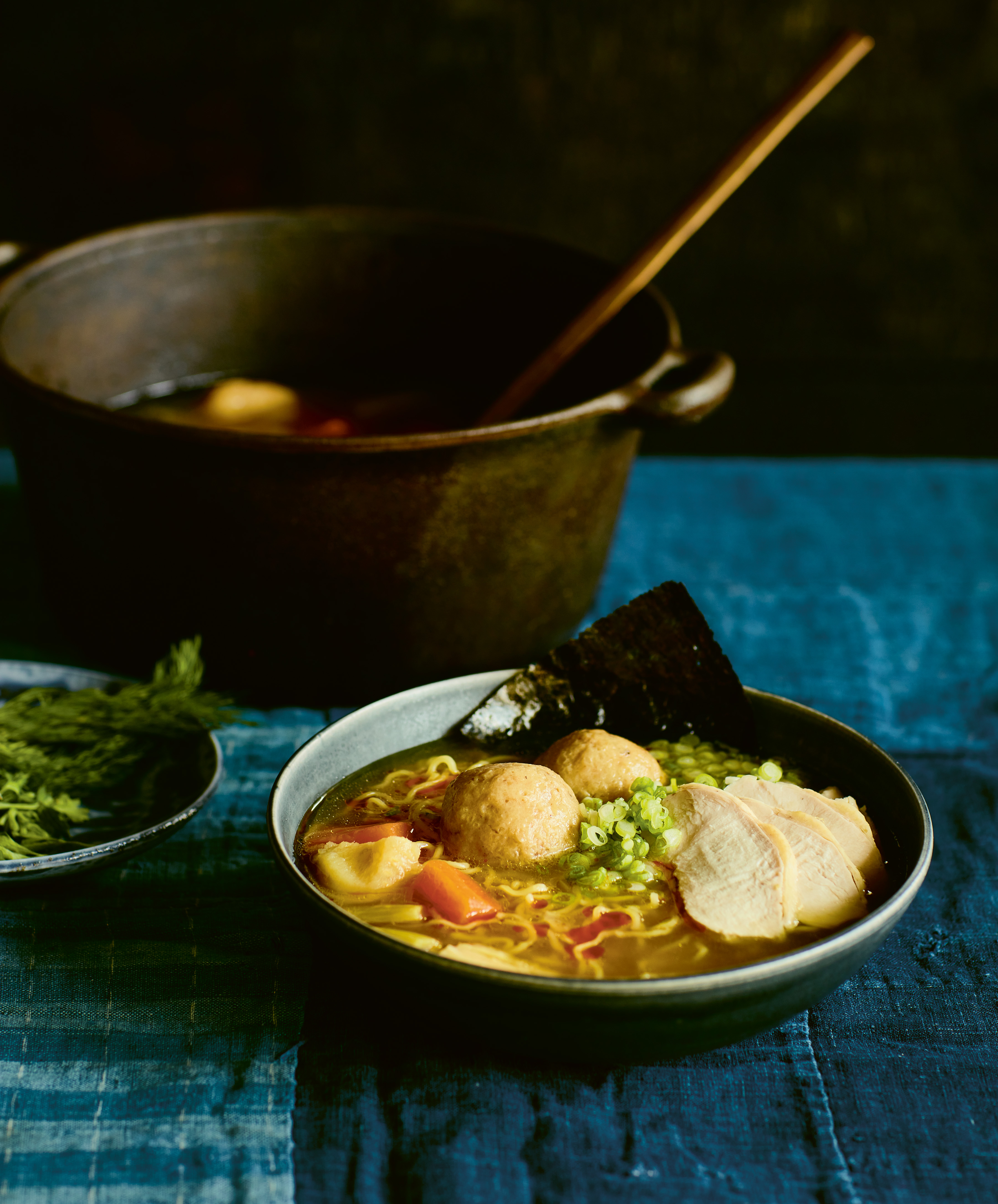Join a community of readers who are committed to Jewish stories
Sign up for JBC’s Nu Reads, a curated selection of Jewish books delivered straight to your door!

Serves 4 to 6 • Active Time: 1 Hour • Total Time: 5 Hours
Chicken Soup
1 whole chicken (4 pounds)
3 tablespoons plus 1 teaspoon kosher salt
4 quarts water
1 (6‑inch) square of kombu
1 bay leaf
1‑inch piece of fresh ginger
Matzoh Balls
1⁄2 cup matzoh meal
1 1⁄2 teaspoons baking powder
1⁄4 teaspoon kosher salt
2 tablespoons canola oil, melted duck fat, or melted chicken fat
2 eggs
1 teaspoon water
For Finishing
1 bunch fresh dill, rinsed
1 bunch curly parsley, rinsed
1 carrot, peeled and cut into 1‑inch pieces
1 small parsnip, peeled and cut into 1‑inch pieces
2 celery stalks, cut into
1‑inch pieces
1 yellow onion, quartered
Kosher salt
1 pound fresh ramen noodles
2 scallions, thinly sliced
Chili oil (optional), such as S&B brand
4 to 6 (4 × 2‑inch) pieces of nori, for garnish

To make the soup: Remove the breast meat from the chicken with the skin intact (see Note) and place on a plate. Season both sides with 1 teaspoon of the salt and refrigerate. Remove the chicken legs by dislocating the thigh bones at the joint where they meet the back. Slice along the joint to detach.
In a large stockpot with a lid, combine the chicken carcass and legs (but not the breasts) and the water. Bring to a boil over high heat, taking care to skim any foam or other impurities that rise to the surface. Reduce the heat to a low simmer. Add the kombu, bay leaf, ginger, and the remaining 3 tablespoons salt. Cover and cook until the meat is tender and comes off the bone easily, 1 1⁄2 hours. Check periodically to be sure it’s only gently simmering, adjusting the heat if necessary.
Meanwhile, to start the matzoh balls: In a small bowl, combine the matzoh meal, baking powder, and salt and thoroughly combine using a fork or your hands. Add the canola oil and combine well, making sure the fat is evenly distributed. In another small bowl, beat the eggs with the 1 teaspoon water.
Pour the eggs into the matzoh meal mixture and mix well. Put a layer of plastic wrap directly on the surface of the matzoh ball batter and refrigerate for at least 30 minutes.
After the chicken has been simmering for 11⁄2 hours, use tongs and a slotted spoon to carefully fish the chicken legs out of the stock. When they’re cool enough to handle, pick the meat off the bones, put in a container, cover, and refrigerate until ready to use. Return the bones to the pot, cover, and continue to gently simmer for another 11⁄2 hours.
To finish: Uncover the stock and add the dill and parsley. Add the breasts to the simmering stock, cover, and simmer until cooked through, 12 to 16 minutes. Carefully remove and check for doneness using a metal skewer or the tip of a knife inserted into the thickest part of the breast. If it’s cooked, the skewer should be very warm to the touch. If it’s not, poach for a few more minutes. Transfer the breasts to a plate to cool. Strain the stock through a sieve into another large pot. (Discard the bones and aromatics.)
Bring a large pot of water to a boil over high heat for the noodles. Add the carrot, parsnip, celery and onion to the stock. Bring to a boil over high heat.
Remove the matzoh ball batter from the refrigerator. Wet your hands to prevent sticking, then roll 8 to 10 balls the size of large marbles (about 1 heaping tablespoon), squeezing once or twice to lightly compress. Drop in the boiling pot of soup. Cover, then reduce the heat to medium, with the soup at a rolling boil. Cook until the matzoh balls have about tripled in size, are soft on the outside and a little spongy in the center, about 30 minutes. Cut one open to test; if they’re undercooked, the center will be dark and dense.
Add the leg meat to the soup to warm through. Season with salt, anywhere from 1 to 3 teaspoons. (The broth needs to be salty because the noodles will absorb the seasoning from the soup.) Thinly slice the chicken breasts and set aside. Drop the ramen noodles into the boiling water and stir. Cook according to the package directions. Drain and distribute among serving bowls.
Ladle the broth over the ramen in the bowls, along with some vegetables, the leg meat, and one or two matzoh balls. Lay a few slices of the breast into each bowl, sprinkle with the scallions and chili oil (if using), and stand a piece of nori along the edge. Serve immediately.
Note To remove the chicken breasts, place the chicken on a cutting board breast side up, with the legs facing you. Starting at the breastbone, slice downward, running your knife along the bone, slightly left of the center of the breast. When you hit the rib cage, angle the knife away toward the left breast, and slice the meat off the bone, pulling the breast away from the rib cage with your free hand. Keep slicing and pulling until you have detached the breast meat. Repeat with the other breast.
Reprinted with permission from Love Japan: Recipes from our Japanese American Kitchen by Sawako Okochi and Aaron Israel; with Gabriella Gershenson, copyright © 2023. Photographs copyright © 2023 by Yuki Sugiura. Published by Ten Speed Press, an imprint of Penguin Random House
Sawako Okochi is co-chef and co-owner of Shalom Japan in Brooklyn, New York, with her husband, Aaron Israel. Sawa’s vibrant culinary background is rooted in her upbringing in Hiroshima, Japan. She has worked at some of the finest restaurants in New York City, including Chanterelle, Annisa, and The Good Fork. She also produced the Otakara Supper Club, which was featured in the New York Times, and appears in Women Chefs of New York and The Jewish Cookbook.
Aaron Israel discovered his passion for cooking while earning his BFA at Maryland Institute College of Art. After graduating, he worked at August in the West Village with chef Tony Liu. He later cooked with chef Andrew Carmellini and helped open Torrisi Italian Specialties. He has co-owned and operated Shalom Japan in Brooklyn with his wife, Sawako Okochi, since 2013.
Gabriella Gershenson is a James Beard Award-nominated food writer and editor based in New York City. Her work has been featured in the New York Times, Saveur, the Wall Street Journal, and many other publications. She was an editor of The 100 Most Jewish Foods and On the Hummus Route. She is currently on staff at Wirecutter.